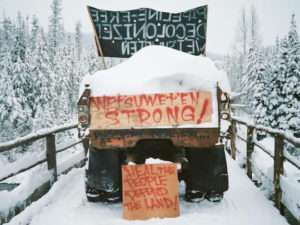Wet’suwet’en land defenders are not criminals

On January 13, the RCMP set up an Access Control Checkpoint on Wet’suwet’en territory, exactly one month after the UN Committee on the Elimination of Racial Discrimination called on Canada “to guarantee that no force will be used against Secwepemc and Wet’suwet’en peoples and that the Royal Canadian Mounted Police and associated security and policing services will be withdrawn from their traditional lands.”
The checkpoint on the Morice West Forest Service Road was in response to the B.C. Supreme Court’s decision to grant Coastal GasLink’s (CGL) application for an interlocutory injunction prohibiting land defenders from interfering with CGL workers on Wet’suwet’en territory.
This checkpoint was established just over a year after heavily armed RCMP officers entered unceded Wet’suwet’en territory on January 7, 2019 and forcibly removed a Gidimt’en checkpoint in response to another court injunction granted to CGL. This action led to the arrest of fourteen land defenders and the bulldozing of traplines and damage to other personal property.
According to Yellowhead Institute research director Shiri Pasternak, “When the court refused to recognize Wet’suwet’en hereditary authority, [the land defenders] become de facto lawless and so are labelled and treated as criminals. So a specter of danger around these supposed criminals is created by the RCMP and other actors.”
Last January’s violent dismantling of the Gidmit’en checkpoint and this month’s establishment of the RCMP checkpoint on Wet’suwet’en land that, among other things, requires Hereditary Chiefs to provide identification to access their territory, ignores the Indigenous rights of the Wet’suwet’en People and the authority of the traditional hereditary leadership, and contradicts the Supreme Court of Canada decision that recognized hereditary leaders as the proper title and rights holders.
The Wet’suwet’en Hereditary Chiefs are acting on an ancestral responsibility to protect the ecological integrity of their lands. Their opposition to the pipeline is based on the threat it poses to their lands and waters, and to the climate.
Like others committed to justice and reconciliation within Canadian society, KAIROS celebrated in November 2019 when British Columbia passed the Declaration on the Rights of Indigenous Peoples Act to implement the UN Declaration on the Rights of Indigenous Peoples. According to the BC government, the Act aims “to create a path forward that respects the human rights of Indigenous peoples while introducing better transparency and predictability in the work we do together.”
A path that respects the human rights of Indigenous peoples does not include armed police officers, violent acts, arrests and check points that prevent Indigenous peoples from accessing their lands. A path that respects the human rights of Indigenous peoples is peaceful, recognizes the sovereignty and jurisdiction of the Wet’suwet’en Peoples, includes the meaningful engagement of the hereditary leaders, protects the rights of land defenders to care for their families, upholds their right to protect the lands and waters for future generations, and respects the Indigenous right of free, prior and informed consent.
KAIROS stands with the Wet’suwet’en Peoples in asserting these rights and calls on government and industry to uphold the rights of Indigenous peoples as expressed in the UN Declaration on the Rights of Indigenous Peoples.
On the same day the RCMP set up their check point the Wet’suwet’en Hereditary Chiefs submitted a formal request to the United Nations to monitor RCMP, government and CGL actions on their traditional, unceded territory. By providing information, independent monitoring is key to the just and peaceful resolution of this situation
For those wishing to do more for the community, please:
- Visit the Unistoten Camp website to learn how to best support the Wet’suwet’en People.
- Contact your MP to request that the Wet’suwet’en People no longer be harassed through punitive tactics such as the checkpoint, and barriers to much needed supplies.
- Contact Premier Horgan and urge him to enter into meaningful and respectful discussions with the Wet’suwet’en People.



